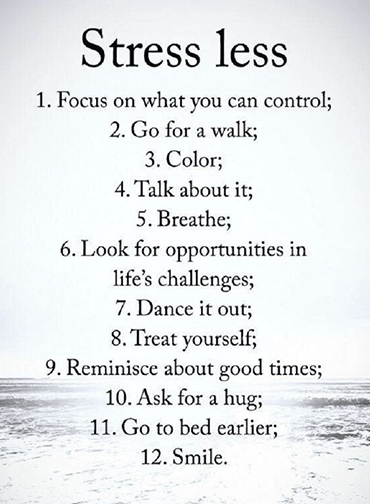Everyone knows how stressful change can be; and I’m sure many of you are going through a lot of odd transitions at the moment. Living in a new place, new classes, making new friends or maybe even new jobs, can all contribute to stress.
These changes occur so fast and they can be very difficult to adjust to at first. Having a basic understanding of what stress is and knowing how to successfully manage that stress using different tools can help make these types of transitions easier to handle.
Here are three tips that can be used to better manage stress and to ease into the changes and transitions you might be going through this year at school:
1. Get a planner (and use it)
One of the most helpful things I can recommend to anyone going through a schedule change would be to have a planner you like and to UTILIZE it. If you don’t have a functional system to write down due dates, classes, and work by now, you should consider getting one. Having a daily to-do list can be an amazing tool to make sure your obligations are completed on time and ensuring you’re prepared for the day, the week, and month to come.
2. Prioritize your responsibilities and time management
When going through a lot of changes, it may be difficult to figure out which commitments come first and which can be set aside. For example, if you’re spending 3 hours a day watching TV and procrastinating your homework, it might be best to put TV as a low priority and save it for after you complete more important responsibilities.
As student, your first obligation will always be classes. After school, the next responsibility for most students will be work and extracurricular activities and these commitments will most likely take up most of your time.
3. Be flexible
A large portion of changes are out of your control and chances are you are going to have to make some changes that you aren’t 100% okay with. Not everything in your transition is going to go as planned. After all, you can only plan so much of life.
Stress may seem like a bad thing that you want to avoid, but to a certain extent, stress is actually a good thing!
Eustress, or good stress, is a challenge that motivates you and pushes you to achieve a goal. Examples of eustress would be when you have an exam tomorrow that you’ve been studying weeks for or when you are trying to finish the last mile in your run.
Distress would be the unhealthy stressors that add discomfort to your life such as a death in the family, injury or illness. There should be a healthy balance between stress and relaxation.
Although having a busy schedule can be daunting, everyone; no matter how busy, needs some relaxation time. Relieving stress is essential to your mental and physical health.
According to the Mayo Clinic website, too much stress can lead to many risks such as anxiety, depression, sleep problems and even heart disease. This makes taking time out of your day to relax essential for optimal health. Relaxation looks different depending on the person, but some of my favorite relaxation activities that can reduce stress include:
- Meditation or yoga
- Going for a walk or hike
- Bubble bath
- Spending time with family and friends
- Going to the gym
- Hammocking
- Reading
- Using calming essential oils such as lavender
- Kayaking/canoeing
- Practicing breathing
Fun Facts About ADDA Staff
- Relaxation increases blood flow to the muscles thereby providing more energy, a better metabolism and improves your memory!
- 85% of college students reported they had felt overwhelmed by everything they had to do at some point within the past year
- Relaxation techniques can lower your heart rate, meaning that practicing meditation or other relaxation techniques can prevent risky heart conditions such as hypertension, stroke and heart attacks.
- Stress kills brain cells; a calm environment permits their growth
“Just because we’re in a stressful situation doesn’t mean that we have to get stressed out. You may be in the storm. The key is, don’t let the storm get in you” – Joel Osteen

